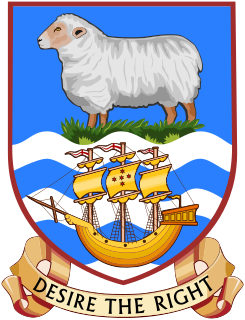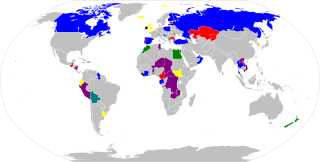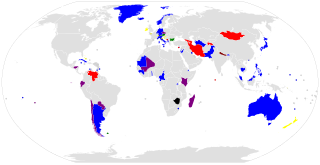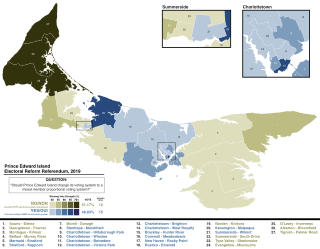National referendums are seldom used in Canada. The first two referendums in 1898 and 1942 saw voters in Quebec and the remainder of Canada take dramatically-opposing stands, and the third in 1992 saw most of the voters take a stand dramatically opposed to that of the politicians in power.
This electoral calendar 2005 lists the national/federal direct elections held in 2005 in the de jure and de facto sovereign states and their dependent territories. Referendums are included, although they are not elections. By-elections are not included.

The Legislative Assembly of the Falkland Islands is the unicameral legislature of the British Overseas Territory of the Falkland Islands. The Legislative Assembly replaced the Legislative Council when the new Constitution of the Falklands came into force in 2009 and laid out the composition, powers and procedures of the islands' legislature.
This electoral calendar 2009 lists the national/federal direct elections held in 2009 in the de jure and de facto sovereign states and their dependent territories. Referendums are included, although they are not elections. By-elections are not included.

The Falkland Islands are an archipelago in the South Atlantic Ocean on the Patagonian Shelf. The principal islands are about 300 mi (480 km) east of South America's southern Patagonian coast and about 752 mi (1,210 km) from the northern tip of the Antarctic Peninsula, at a latitude of about 52°S. The archipelago, with an area of 4,700 sq mi (12,000 km2), comprises East Falkland, West Falkland, and 776 smaller islands. As a British overseas territory, the Falklands have internal self-governance, and the United Kingdom takes responsibility for their defence and foreign affairs. The capital and largest settlement is Stanley on East Falkland.
A referendum was held in the Canadian province of Prince Edward Island on November 28, 2005, to determine whether to adopt the Mixed Member Proportional (MMP) system as recommended by the Prince Edward Island Electoral Reform Commission in 2003.

The following outline is provided as an overview of and topical guide to the Falkland Islands:
Electoral reform is change in electoral systems to improve how public desires are expressed in election results. That can include reforms of:

This national electoral calendar for the year 2011 lists the national/federal direct elections held in 2011 in the de jure and de facto sovereign states and their dependent territories. By-elections are excluded, though national referendums are included.

The Falkland Islands general election of 2001 was held on Thursday 22 November 2001 to elect members to the Legislative Council through universal suffrage using block voting. Chief Executive Michael Blanch acted as Chief Counting Officer.

This national electoral calendar for 2013 lists the national/federal direct elections that were held in 2013 in all sovereign states and their dependent territories. By-elections are excluded, though national referendums are included.

A referendum on reforming the voting system was held in the Falkland Islands on 3 November 2011. Voters were asked "Do you want a single constituency for the whole of the Islands?" The proposal required a two-thirds majority in both of the islands' constituencies, but was rejected by 58.78% of voters overall; in Stanley it was narrowly approved by 50.2% of voters but in Camp it was widely rejected, with 84% voting against. Turnout was 70% in Camp and just 39% in Stanley.
A referendum on political status was held in the Falkland Islands on 10–11 March 2013. The Falkland Islanders were asked whether or not they supported the continuation of their status as an Overseas Territory of the United Kingdom in view of Argentina's call for negotiations on the islands' sovereignty.

An unofficial status referendum was held in the Falkland Islands on 2 April 1986. The result was 96% in favour of continued British sovereignty, with 88% of registered voters taking part.
A non-binding referendum on electoral reform was held in the Canadian province of Prince Edward Island between 27 October – 7 November 2016. This was the second electoral reform referendum to be held in Prince Edward Island, following a vote to maintain the status quo in 2005. The referendum asked which of five voting systems residents would prefer to use in electing members to the Legislative Assembly of Prince Edward Island. The referendum involved four instant run-off counts and indicated mixed member proportional representation was the majority choice with 55.03% support on the final ballot, with support of 52.42% of votes cast.

A referendum on electoral reform was held on April 23, 2019 in the Canadian province of Prince Edward Island – simultaneously with the 2019 provincial election – to determine if the province should adopt a mixed-member proportional representation voting system (MMP). A narrow majority voted to keep the existing first-past-the-post system. However, the referendum was not binding, as neither the yes or no side received majority support in 60% or more of the province's 27 electoral districts.

A referendum on reforming the electoral system was held in the Falkland Islands on 24 September 2020, after being postponed from 26 March 2020 following the Coronavirus pandemic. Voters were asked if they wanted to replace the two existing electoral constituencies with a single constituency for the whole of the Islands. Although a majority of those who voted supported the change, the required two-thirds majority in both of the islands' constituencies was not achieved.